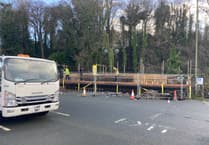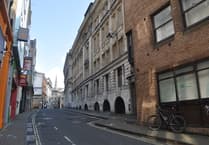COUNCILLORS have been scratching their heads over whether they should allow the multi-coloured Pride flag to fly from the ‘official’ pole outside Tavistock Town Hall.
Organisers of the first-ever Pride festival in Tavistock have asked the town council to fly their Rainbow flag from the ‘municipal’ flagpole on the day of the event, June 25.
They have already received permission to do so at West Devon Borough Council’s Kilworthy Park headquarters in Tavistock.
The event is also being heavily backed by businesses throughout the town, who have said they will be happy to fly the flag in support of the festival.
But a similar approach to the town council, who are effectively hosting the festival on the Meadows, which is their property, has set off some warning bells.
According to a report being mulled over by the town council’s budget and policy committee on Tuesday, the authority only allows national or municipal flags to be flown from the flag pole.
Officers have made it clear the authority has avoided flying anything which might imply bias towards to any political party or other organisation.
Councillors have been reminded of how they got involved a row over an interpretation board near the statue of Sir Francis Drake, the town’s most famous son, recently.
The authority attempted to provide an accurate representation of the Elizabethan buccaneer’s involvement in the slave trade as well as marking his role in defeating the Spanish invasion armada, which drew the ire of the Ethnic Patriots of Great Britain, as well as a few disgruntled residents.
The rethinking over the plaque came against a back of protests by the Black Lives Matter movement following the murder of George Floyd by a Minneapolis police officer in 2020. The fall-out from the protest saw calls for the statues of anyone involved in the slave trade to be removed.
A report by town council clerk Carl Hearn, which examined changing the authority’s flag-flying policy, said there were ‘already many avenues whereby organisations and groups can advertise or promote themselves on council land, such as advertising boards, banners, ‘A’ frames, posters or temporary signage, for which the authority usually charge a fee.
Charging a fee, said Mr Hearn, represented ‘no or implied endorsement by the council. It is a solely commercial transaction and the fee reflects that the council incurs cost in such matters and that there is a benefit to the organisation/cause concerned.’
On the other hand, said Mr Hearn, flying a non-national or non-municipal flag ‘implicitly accords endorsement by the flag pole owner – the council and the town community it represents’.
He added: ‘Society is anecdotally becoming increasingly fractured on issues, as evidenced locally in recent times. Accordingly, the endorsement that the flying of a flag representing a private or public grouping, or organisation other than the whole community from a public building/civic flagpole, could have the potential to be divisive and, on occasion, political.’
Solutions, said Mr Hearn, could also included providing a second flag pole, but that would involve expense to the council and was not recommended ‘at this time’.
Mr Hearn said in his report: ‘Some councils do not accept requests for flags to be flown in view of the precedent that could be set, others take the view that a flag may be flown where it represents an organisation ‘with deep roots (in the community) and that gives benefit to the community’.
Another solution, he suggests, is allowing the flag to be draped in the space presently reserved for banners in Bedford Squire for the day of the festival, which would allow for their flag-flying policy to stay as it is and would avoid the problems he had outlined.





Comments
This article has no comments yet. Be the first to leave a comment.